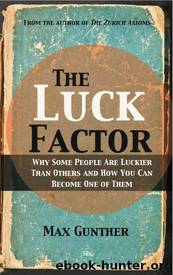The Luck Factor by Max Gunther

Author:Max Gunther
Language: eng
Format: epub
Publisher: Harriman House
Chapter 3: Charms, Signs, and Portents
My father used to tell a story about causes and effects. Every day at precisely noon a fellow turns up on a busy street corner with a green flag and a bugle. He waves the flag, blows a few notes on the bugle, utters a mysterious incantation, and goes away. A cop, observing this exercise over a period of weeks, finally gets overwhelmed by curiosity. "What the hell are you doing?" asks the cop. "Keeping giraffes away," says the fellow. The cop says, "But there are no giraffes around here." The fellow says, "Doing a good job, ain't I?"
The characters in this story changed over the years, and often there were ribald elements in it, but the point was always the same. My father told it to refute what he called "silly damned superstitions," in which category he included all occult and mystical beliefs about luck. He was a Swiss banker, a man solidly rooted in the pragmatic industrial culture of Western Europe and America. If he could not actually see a cause operating to produce an effect – if he couldn't see precisely how the two were linked in terms of known physical laws – he doubted that any link existed.
And so he told the giraffe story whenever anybody tried to offer evidence in support of astrology: "My horoscope predicted exactly what would happen to me this week!" Or lucky numbers: "See, what did I tell you? I knew it would turn out fine because today is the sixth of the month!" Or Tarot cards, tea leaves, black cats, ladders, spilled salt, broken mirrors, rabbits' feet, or any of the hundreds of other things that are alleged to predict or influence luck.
The point of the story was unarguably sensible, of course. It is a logical fallacy to infer a cause-and-effect relationship from mere proximity. When two events happen simultaneously or consecutively, it may or may not be true that one is the cause of the other. If a black cat crossed your path last week and you broke your leg this week, it may be unjust to blame the cat.
On the other hand, some insinuate. . . who knows? It may be just as bad a fallacy to deny the existence of a causal link only because you can't see it. Devotees of astrology and other occult and mystical beliefs regard this thought as a main supporting pillar – however shaky – of their various rationales. They charge that our hard, practical, thing-oriented culture grants too little room to anything that can't be weighed, measured, or analyzed in a computer. "Just because a thing can't be explained in terms of your materialistic Western science," they say, "that's no reason to . . ."
They quote Hamlet a lot. Hamlet said: "There are more things in heaven and earth, Horatio, than are dreamt of in your philosophy." Hamlet was trying to tell his friend that he had just had a long conversation with a ghost. Those
Download
This site does not store any files on its server. We only index and link to content provided by other sites. Please contact the content providers to delete copyright contents if any and email us, we'll remove relevant links or contents immediately.
Spare by Prince Harry The Duke of Sussex(5147)
Machine Learning at Scale with H2O by Gregory Keys | David Whiting(4266)
Never by Ken Follett(3887)
Harry Potter and the Goblet Of Fire by J.K. Rowling(3816)
I Have Something to Say by John Bowe(3483)
Unfinished: A Memoir by Priyanka Chopra Jonas(3357)
Fairy Tale by Stephen King(3313)
Greenlights by Matthew McConaughey(3113)
The Man Who Died Twice by Richard Osman(3046)
Will by Will Smith(2878)
Think Again by Adam Grant(2436)
Rationality by Steven Pinker(2331)
The Dark Hours by Michael Connelly(2283)
Can't Hurt Me: Master Your Mind and Defy the Odds - Clean Edition by David Goggins(2282)
It Starts With Us (It Ends with Us #2) by Colleen Hoover(2265)
The Storyteller by Dave Grohl(2200)
Friends, Lovers, and the Big Terrible Thing by Matthew Perry(2188)
The Dawn of Everything: A New History of Humanity by David Graeber & David Wengrow(2163)
The Becoming by Nora Roberts(2161)
